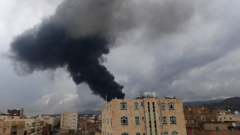In a significant move, Defense Secretary Pete Hegseth has confirmed the dismissal of Lt Gen Jeffery Kruse, the head of the Defense Intelligence Agency (DIA), just weeks after a contentious report regarding US military actions in Iran drew criticism from the White House. Along with Kruse, two high-ranking military officials have also been removed from their posts by the Pentagon, although no detailed explanations for their firings have been provided by the Department of Defense.
Pentagon Dismisses Defense Intelligence Chief Amid Controversial Iran Assessment

Pentagon Dismisses Defense Intelligence Chief Amid Controversial Iran Assessment
The Pentagon's leadership shakeup follows a contentious evaluation of US attacks on Iran's nuclear capabilities.
The controversy erupted following a DIA report leaked in June, which suggested that recent US strikes had only delayed Iran's nuclear program by a matter of months. President Trump responded forcefully, labeling the agency's finding as "flat out wrong" and asserting that Iran's nuclear sites had been "completely destroyed." At that time, he criticized the media for what he saw as an attempt to undermine the success of American military operations.
Secretary Hegseth echoed Trump's sentiments, stating that the report was based on "low intelligence" and that the FBI had begun investigating the source of the leak. Kruse's removal was initially reported by the Washington Post, prompting inquiries from various news organizations, including the BBC, regarding the Pentagon's rationale.
Reports indicate that Hegseth also ordered the dismissal of the chief of US Naval Reserves and the commander of Naval Special Warfare Command, according to an anonymous source. Senator Mark Warner has reacted to Kruse's firing, voicing concerns that such actions signal a troubling trend by Trump of interpreting intelligence assessments as loyalty tests, rather than a means of safeguarding national security.
This is not the first instance of President Trump distancing himself from officials whose analyses diverge from his views. Previous dismissals have included Commissioner of Labor Statistics Erika McEntarfer and NSA Director General Timothy Haugh, as part of a broader pattern of leadership changes at the Pentagon and beyond.
The DIA plays a crucial role in military intelligence operations and differs from other intelligence entities, like the CIA, by focusing primarily on military-related intelligence. In light of these recent developments, the Pentagon finds itself in a period of transition with implications for its intelligence framework and military strategies going forward.
Secretary Hegseth echoed Trump's sentiments, stating that the report was based on "low intelligence" and that the FBI had begun investigating the source of the leak. Kruse's removal was initially reported by the Washington Post, prompting inquiries from various news organizations, including the BBC, regarding the Pentagon's rationale.
Reports indicate that Hegseth also ordered the dismissal of the chief of US Naval Reserves and the commander of Naval Special Warfare Command, according to an anonymous source. Senator Mark Warner has reacted to Kruse's firing, voicing concerns that such actions signal a troubling trend by Trump of interpreting intelligence assessments as loyalty tests, rather than a means of safeguarding national security.
This is not the first instance of President Trump distancing himself from officials whose analyses diverge from his views. Previous dismissals have included Commissioner of Labor Statistics Erika McEntarfer and NSA Director General Timothy Haugh, as part of a broader pattern of leadership changes at the Pentagon and beyond.
The DIA plays a crucial role in military intelligence operations and differs from other intelligence entities, like the CIA, by focusing primarily on military-related intelligence. In light of these recent developments, the Pentagon finds itself in a period of transition with implications for its intelligence framework and military strategies going forward.


















